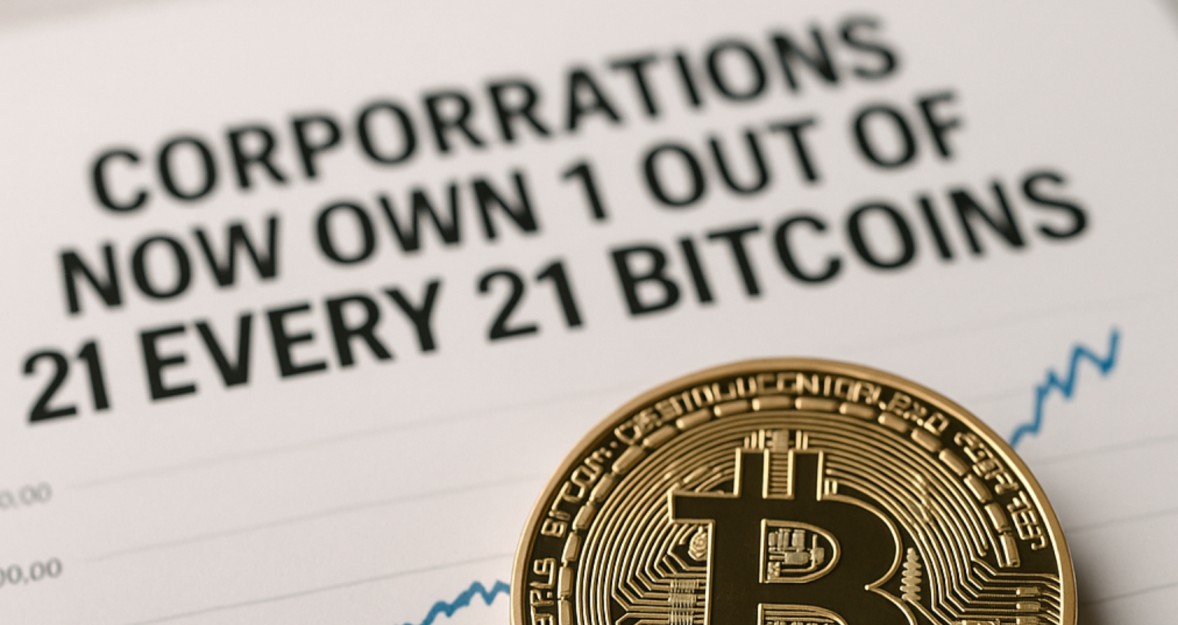Introduction
Bitcoin was once viewed as a tool for retail investors, tech enthusiasts, and early adopters. Over the years, however, it has steadily moved into the corporate and institutional mainstream. Today, a striking reality has emerged: corporations collectively own nearly 1 out of every 21 Bitcoins in circulation. This represents roughly 4.5–5% of the total Bitcoin supply — a development that is reshaping the dynamics of the crypto market and altering how businesses manage their treasuries.
Understanding the Claim
The maximum supply of Bitcoin is 21 million coins. Saying that corporations own “1 out of 21” implies that they hold about 1 million Bitcoins. While exact numbers vary depending on how “corporation” is defined (public companies only vs. including private firms and ETFs), estimates consistently show that corporate holdings have grown into the multi-hundred-thousand BTC range.
This trend is significant because it marks a transition: Bitcoin is no longer just a grassroots or retail phenomenon but a recognized financial instrument embedded in global corporate balance sheets.
Major Corporate Holders of Bitcoin
The growth in corporate Bitcoin holdings has been driven by a handful of large players and a growing list of smaller entrants. Some of the most notable corporate holders include:
- MicroStrategy
- Holds more Bitcoin than any other public company.
- Its CEO, Michael Saylor, has spearheaded an aggressive acquisition strategy, transforming the company into a de facto Bitcoin holding firm.
- Its treasury surpasses 200,000 BTC, symbolizing corporate conviction in Bitcoin as a primary reserve asset.
- Tesla
- Originally bought 48,000+ BTC in 2021.
- Later sold a portion, but still retains a significant balance.
- Its move was groundbreaking as it made Bitcoin part of a global Fortune 500 treasury.
- Marathon Digital Holdings & Riot Platforms
- Bitcoin mining firms that accumulate and hold BTC as part of operations.
- They collectively account for tens of thousands of coins.
- Galaxy Digital & Coinbase
- Crypto-native financial services companies with strong BTC positions.
- Their holdings combine proprietary investments with custodial assets.
- Other Corporate Entities
- Square (now Block), CleanSpark, Hut 8, and other mining or fintech firms.
- Private companies like Stone Ridge and institutional vehicles such as ETFs also contribute to corporate holdings.
Together, these firms form the backbone of corporate Bitcoin ownership, with hundreds of others holding smaller but still material amounts.
Why Are Corporations Accumulating Bitcoin?
The surge in corporate ownership is not accidental. Several key motivations explain the trend:
1. Treasury Diversification
Corporations with large cash reserves are wary of inflation and fiat devaluation. Holding a portion in Bitcoin is seen as a diversification strategy, spreading risk across traditional and alternative assets.
2. Inflation Hedge
Bitcoin’s capped supply of 21 million makes it attractive as a hedge against inflation. In a world of monetary expansion and negative real interest rates, Bitcoin appeals as a form of “digital gold.”
3. Strategic Signaling
Some firms adopt Bitcoin not only for financial reasons but also for branding. Aligning with Bitcoin signals innovation, future-readiness, and alignment with new financial paradigms.
4. Access to Capital & Market Leverage
Companies like MicroStrategy have issued convertible bonds to finance Bitcoin acquisitions. This unique financial engineering demonstrates how corporations can leverage equity markets to accumulate BTC.
5. Regulatory & Institutional Maturity
The availability of regulated custodians, insurance products, and clearer accounting standards has lowered the barrier for corporate entry into Bitcoin.

Risks & Challenges for Corporate Holders
Despite the enthusiasm, corporate Bitcoin ownership is not without risks:
- Volatility
Bitcoin’s extreme price swings can cause massive mark-to-market fluctuations on balance sheets. - Accounting Standards
Many jurisdictions still classify Bitcoin as an intangible asset, forcing companies to impair holdings during downturns but not necessarily recognize gains until sold. - Regulatory Scrutiny
As corporate exposure grows, regulators may impose stricter rules around disclosure, taxation, and risk reporting. - Liquidity Pressure
Corporations holding massive amounts of BTC may struggle to liquidate positions without moving the market. - Investor Reactions
Not all shareholders are supportive. Some view Bitcoin holdings as speculative or distracting from a company’s core business.
Implications for the Bitcoin Ecosystem
The fact that corporations now own 1 in every 21 Bitcoins has several market-wide consequences:
- Reduced Circulating Supply
With large amounts locked in corporate treasuries, fewer coins are available for everyday trading. This contributes to scarcity and potentially supports higher prices during bull cycles. - Institutional Legitimacy
Corporate participation signals to governments, regulators, and investors that Bitcoin is no longer fringe. This enhances its legitimacy as an asset class. - Price Stability — and Instability
On one hand, long-term corporate holders may reduce selling pressure. On the other hand, if multiple corporations were forced to sell during downturns, it could trigger sharp market shocks. - Regulatory Spotlight
With billions in corporate treasuries tied to Bitcoin, regulators are incentivized to provide clearer frameworks, further accelerating adoption. - Market Benchmarking
Bitcoin’s role as a reserve asset in corporate accounts may inspire new benchmarks for financial markets, potentially leading to derivative products, credit instruments, and ETFs linked to corporate BTC reserves.
Looking Ahead
The future of corporate Bitcoin ownership depends on multiple factors:
- Macro Environment: High inflation or currency instability will likely accelerate adoption.
- Regulatory Clarity: Transparent rules around custody, taxation, and reporting will reduce barriers.
- Corporate Governance: Shareholder approval and board support remain crucial.
- Competition: Bitcoin’s dominance may face challenges if alternative assets or CBDCs emerge as strong hedges.
- Price Cycles: A sustained bull market could encourage more corporate buyers, while extended downturns could deter new entrants.
Conclusion
The statement that corporations now own 1 out of every 21 Bitcoins highlights one of the most profound shifts in Bitcoin’s history. From a peer-to-peer experiment to a strategic reserve asset, Bitcoin has found a place in the corporate world.
While risks remain — volatility, regulatory scrutiny, and shareholder pushback — the long-term implications are clear: Bitcoin is no longer just a decentralized currency experiment. It is now an asset class woven into the fabric of corporate finance, signaling that its role in the global economy has only just begun.











